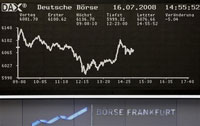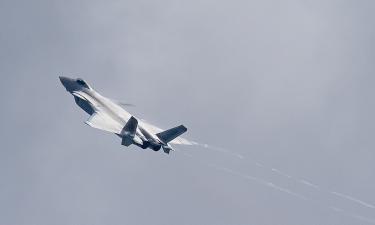Asian markets rise on strengthening dollar
Most Asian markets rose Monday on a strengthening dollar, lower oil prices and optimism about global stock markets, but benchmark indices in China and Hong Kong declined on government data that fanned inflation worries.

Tokyo's Nikkei 225 Stock Average added nearly 2 percent to close at 13,430.91 after inching up 0.33 percent at the end of last week.
China's Shanghai Composite Index, meanwhile, fell 5.2 percent to finish at 2,470.07 following the release of economic data showing the country's wholesale price inflation jumped to its highest level in 12 years during July.
That was Shanghai's lowest close in nearly a year and a half. Airlines, textile exporters and refiners led the decline, with two of three major publicly traded airlines dropped by the daily maximum 10 percent.
The drop in mainland shares pulled Hong Kong's Hang Seng Index down 0.12 percent to 21,859.34, erasing early gains that had lifted the stock measure as high as 22,235.51.
Elsewhere, the main stock benchmark in Jakarta, Indonesia, fell almost 3 percent, while most other major Asian benchmarks rose. Indices gained ground in Australia, India, Singapore, South Korea, Thailand and Taiwan.
Japanese shares got a lift from several positive factors, including a recovering dollar, which is trading just below 110 yen compared with levels below 100 a few months ago. A strong dollar is a boost to Japanese exporters by lifting the value of their overseas earnings.
Auto shares such as Toyota Motor Corp. and Honda Motor Co. were among the gainers, with both jumping more than 4 percent.
Although oil prices rebounded to above US$116 a barrel Monday on concerns that a widening conflict between Russia and Georgia over a breakaway province would disrupt supplies, crude futures are still more than US$30 off a record hit in July above US$147 a barrel.
Hiroichi Nishi, of the equity section at Nikko Cordial Securities Co. in Tokyo, said even recent lackluster profit reports from Japanese companies were cause for market optimism as that meant the end of bad news.
"The prospects are brighter ahead, and so that's encouraging some buying of shares," he said.
The recent surge in global stock markets also worked as a plus for Tokyo issues, he said, as the gains on Wall Street and in European markets have been heftier than on the Tokyo Stock Exchange.
U.S. shares rebounded sharply Friday, shooting higher on the back of a surging dollar and plunging oil prices. The Dow Jones industrials soared more than 300 points, or 2.7 percent, more than wiping out a big loss from the previous session.
Hurting Chinese sentiment was Beijing's report Monday that the producer price index, or PPI, rose 10 percent in July over a year earlier, its highest rate of increase since 1996 and a jump over June's 8.8 percent rate. Such increases, fueled by rising energy and raw materials costs, add to pressure on consumer prices, complicating Beijing's effort to rein in politically sensitive inflation.
Chinese investors have become increasingly jittery over the economic outlook amid signs that the malaise afflicting the U.S. and Europe might be spreading to Asia, with corporate earnings bound to suffer.
A steadying of global crude oil prices failed to buoy airlines amid concern over weakening passenger demand.
Air China and China Easter Airlines were the two major airlines to hit the daily downside limit. China Southern Airlines was nearly there, dropping 9.9 percent,
China Eastern Airlines announced late Sunday that a deal to sell a strategic stake to Singapore Airlines and Temasek Holdings, the investment arm of the Singaporean government, was off after they failed to meet Saturday's deadline for reaching a final agreement.
Oil refiner China Petroleum & Chemical Corp. fell 5.4 percent and PetroChina plunged 5.54 percent.
Aluminum giant Chinalco also fell by the 10 percent limit. Property developer China Vanke slumped 5.6 percent.
In Hong Kong, Chineses airline tumbled as well. Carrier China Eastern Airlines was hardest hit, dropping 7.9 percent. China Southern plunged 6.6 percent, while Air China lost 2.4 percent.
"We got hit on the head with the PPI," said Francis Lun, general manager of Fulbright Securities Ltd. "This was an excuse to sell off the market."
Upstream oil producer CNOOC retreated 3.2 percent as oil prices rebounded.
In other stocks, sportswear company Li Ning Co. jumped 3.5 percent after its star athlete owner captured world attention Friday as the final torchbearer in the Beijing Olympics.
Foxconn International Holdings, the leading contract mobile phone maker, surged 9.5 percent to HK$7.75 on solid revenue growth from its parent company in Taiwan.
The dollar was trading in Tokyo midafternoon Monday at 109.95 yen. The euro was at US$1.5010.
Subscribe to Pravda.Ru Telegram channel, Facebook, RSS!



